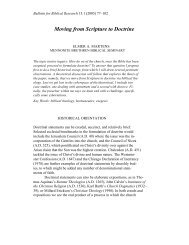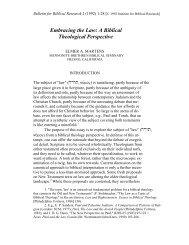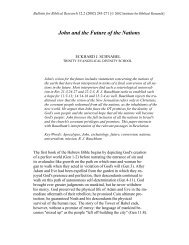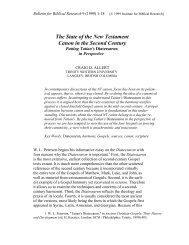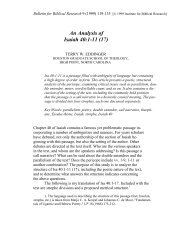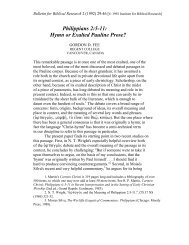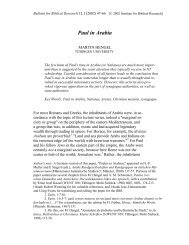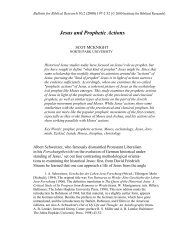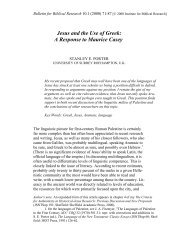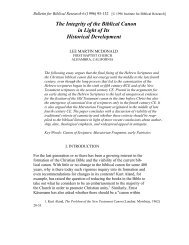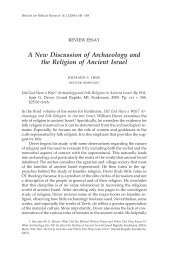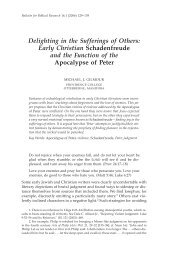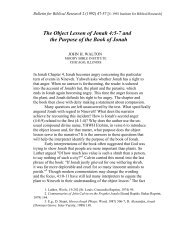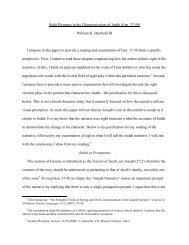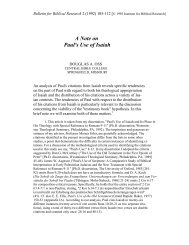Reflections on Exegesis and Spirituality in Philippians 4:10-20
Reflections on Exegesis and Spirituality in Philippians 4:10-20
Reflections on Exegesis and Spirituality in Philippians 4:10-20
You also want an ePaper? Increase the reach of your titles
YUMPU automatically turns print PDFs into web optimized ePapers that Google loves.
Fee: To What End <strong>Exegesis</strong>? 77<br />
rules. To be sure, my bias was basically c<strong>on</strong>servative toward all historical<br />
data—<strong>in</strong>nocent until proven guilty—<strong>and</strong> my own experience<br />
of God also biased me historically <strong>in</strong> the directi<strong>on</strong> that God had<br />
<strong>in</strong>tervened <strong>in</strong> history, the underst<strong>and</strong><strong>in</strong>g of which <strong>in</strong>terventi<strong>on</strong> I also<br />
took to be part of the historical task.<br />
My schizophrenia came about because I never for a moment<br />
believed that these texts were noth<strong>in</strong>g more than simply objects of<br />
historical research. These texts were my s<strong>in</strong>gular passi<strong>on</strong>, because<br />
here<strong>in</strong> I had been encountered by the liv<strong>in</strong>g God, who <strong>in</strong> Christ <strong>and</strong><br />
by the Spirit called me to himself to be a passi<strong>on</strong>ate lover of God.<br />
This, <strong>and</strong> this al<strong>on</strong>e, was my <strong>on</strong>ly reas<strong>on</strong> for ever becom<strong>in</strong>g an exegete:<br />
to become a better reader of the texts, so that I might both live<br />
out the life they called me to (that is, to enter <strong>in</strong>to their own <strong>Spirituality</strong><br />
2 ) <strong>and</strong> share this passi<strong>on</strong> with others. Indeed, this is the <strong>on</strong>ly<br />
way I have ever taught <strong>in</strong> over thirty years <strong>in</strong> the classroom.<br />
But it was precisely this dimensi<strong>on</strong> (my <strong>on</strong>ly reas<strong>on</strong> ever for do<strong>in</strong>g<br />
this work <strong>in</strong> the first place) that was never allowed expressi<strong>on</strong> <strong>in</strong><br />
the academy. Here we had to take the first task of exegesis not <strong>on</strong>ly<br />
as the first or even primary <strong>on</strong>e, but as the <strong>on</strong>ly <strong>on</strong>e. Anyth<strong>in</strong>g that<br />
even smacked of car<strong>in</strong>g about the <strong>Spirituality</strong> of the text—be it its<br />
own theology or its doxology or its call to discipleship—<strong>on</strong> the part<br />
of the scholar was disallowed by the present rules of the game. Thus<br />
I found myself try<strong>in</strong>g to play baseball but was allowed to play <strong>on</strong>ly<br />
by the rules of soccer, without the use of h<strong>and</strong>s <strong>and</strong> arms.<br />
As many of you will recognize, with the publicati<strong>on</strong> of my 1 Cor<strong>in</strong>thians<br />
commentary ten years ago, I ventured to start play<strong>in</strong>g by the<br />
earlier set of rules when the texts were studied primarily by scholars<br />
with<strong>in</strong> the community of faith. S<strong>in</strong>ce I had brought much of this<br />
exegesis to bear <strong>in</strong> every k<strong>in</strong>d of church sett<strong>in</strong>g <strong>and</strong> s<strong>in</strong>ce <strong>in</strong> these<br />
sett<strong>in</strong>gs I could not imag<strong>in</strong>e not ask<strong>in</strong>g <strong>and</strong> offer<strong>in</strong>g some po<strong>in</strong>ters<br />
toward soluti<strong>on</strong>s of the "so what?" questi<strong>on</strong>s, I regularly <strong>in</strong>cluded<br />
these <strong>in</strong> the commentary itself. Why do the history if the <strong>Spirituality</strong><br />
<strong>in</strong>herent <strong>in</strong> the text itself did not matter a whit? This is what I always<br />
did <strong>in</strong> the classroom, <strong>and</strong> I knew students who had taken the course<br />
<strong>in</strong> 1 Cor<strong>in</strong>thians from me would sense that I had lost my <strong>in</strong>tegrity if<br />
I did not do the same <strong>in</strong> the commentary. I also admit that I did so<br />
with a c<strong>on</strong>siderable amount of fear <strong>and</strong> trembl<strong>in</strong>g: <strong>on</strong> the <strong>on</strong>e h<strong>and</strong>,<br />
because I knew I was break<strong>in</strong>g the rules <strong>and</strong> therefore that the commentary<br />
might have a much more limited usefulness than I would<br />
have hoped; <strong>on</strong> the other h<strong>and</strong>, because I grew up <strong>in</strong> a c<strong>on</strong>text where<br />
"<strong>Spirituality</strong>" was the <strong>on</strong>ly th<strong>in</strong>g most people did with the texts, <strong>and</strong><br />
2. For my reas<strong>on</strong>s for capitaliz<strong>in</strong>g this word, see the discussi<strong>on</strong> <strong>in</strong> the next secti<strong>on</strong>,<br />
"On the Mean<strong>in</strong>g of <strong>Spirituality</strong>."



